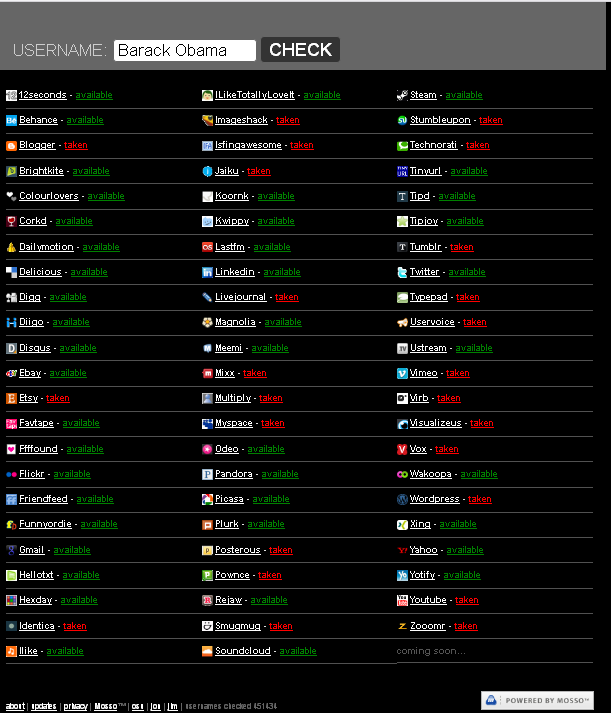On-Line Reputation Management
On-Line Reputation management is a huge topic today in the Web 2.0 world as everyone from friends to employers are looking on the Internet for information on new friends, acquaintances, or hires. But as we worry about who is seeing what we do, have you wondered about who is out there pretending to be us?
While we’re all familiar with the concept of cyber-squatting in naming websites, the proliferation of social media sites has created a new problem where people are using identities that would indicate that they are someone other than who then are. Possibly the best know example would be Shaquille O’Neal – if you search for “Shaq” on Twitter you get 17 results but only one is the real Shaq.
So What Can We do to Stake our Claim?
An easy solution to the dilemma is to use Usernamecheck.com . This simple application allows you to enter the name that you use (or wish to use) and it will ping a number of popular sites (68 currently) and lets you know in a simple organized manner where that name is already used.The names of the various sites act as links to those sites, so you don;t even have to leave the site to correct an oversight on your part. A quick and easy solution to the issue.
So get on and get updated.
Bill is an unusual blend of Old & New - The CEO Century 21 Advantage Gold (Philadelphia's Largest Century 21 company and BuzzBuilderz (a Social Media Marketing Company), He is a Ninja CEO, blending the Web 1 and 2.0 world together in a fashion that stretches the fabric of the universe. You can follow him on twitter @Billlublin or Facebook or LinkedIn.











































Bob Carney
January 14, 2009 at 8:59 am
Thanks Bill for the link. I find it somewhat useful, but I really don’t want to be on most of these “quality” sites.
Teresa Boardman
January 14, 2009 at 9:06 am
Sweet. I’ll have to check it out. I don’t use my name much for my business but I did meet some Teresa boardman’s and we formed a group in facebook. It is fun.
Bob
January 14, 2009 at 12:23 pm
I cant believe how many people are using my name.
Ken Brand
January 14, 2009 at 8:08 pm
I love all the sharing. I learn about so many cool, unique and interesting tools, toys and gee-whizes from you guys.
Thanks.
Bill Lublin
January 14, 2009 at 9:21 pm
Thanks for all of your comments – you are all unique identites – Fer sure 😉
Linda Davis
January 15, 2009 at 8:31 am
I hate my name. It’s all my husband’s fault. I had a nice unique Italian name. Hmmpfh
Brandie Young
January 17, 2009 at 7:50 pm
Bill – cool tip Usernamecheck.com! Thanks so much!
Karen Goodman
January 20, 2009 at 7:16 pm
Part of me thinks that I should stick to the same username across platforms to help build my personal brand, but it just isn’t always possible.
Depending on the site and usernames available, I use a combination of: kgoodman, kgoodman67, karen67 (Recipezaar), karenstl (Twitter), Karen Goodman (LinkedIn) and stlouispics (Flickr). I think that most social media sites will start allowing you to enter your real name like you can on Twitter, so people will always be able to find you when they do a search.
Still, it was fun to check and see which sites had my real name already taken.